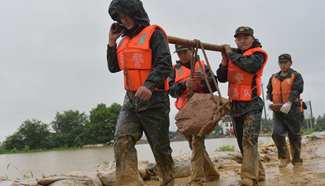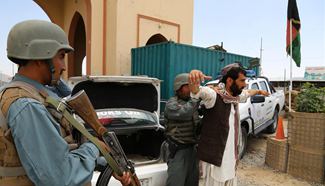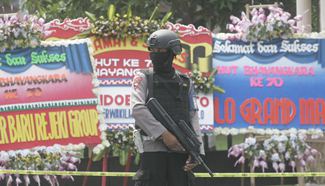BEIJING, July 5 (Xinhua) -- The United States' muddying the waters of the South China Sea is exactly the same in nature as its interference in Latin American affairs, a veteran Nicaraguan diplomat has said.
Washington attempted to benefit from the South China Sea disputes by meddling in the regional situation, just like it did by interfering in Latin American affairs, Carlos Garcia said in a recent interview with Xinhua, adding that Southeast Asian countries should have a clear understanding of the U.S. act.
In history, the U.S. government, following the Monroe Doctrine's "leave America for Americans," frequently interfered in Latin American affairs, including territorial disputes, and has even occupied the territory of Latin American countries by force, unveiling its true face of hegemonism.
INTERFERING IN TERRITORIAL DISPUTES
The United States has in the past interfered in territorial disputes in Latin America to provoke conflict between nations in the region and profit from them. One typical example is interfering in the sovereignty of San Andres island.
San Andres island, located in the west of the Caribbean Sea and about 750 km from Colombia, has an important strategic position.
During the Spanish colonization, the island was part of the viceroyalty of New Granada. In 1821, Gran Colombia, which included the territories of present-day Colombia, Ecuador, Venezuela, Panama and parts of Nicaragua, Costa Rica and Honduras, declared independence. San Andres chose to join Gran Colombia.
In 1903, the U.S. army arrived in Panama, instigated Panama's independence from Gran Colombia and later obtained control over the Panama Canal.
Before landing in Panama, the U.S. government sent envoys to San Andres to persuade it to become a part of Panama so that it could control the island after Panama declared independence. But the islanders refused the U.S. request, which they considered as treason.
However, the United States did not give up. It sent a warship in 1903 to San Andres, putting pressure on the island, but the islanders again refused to join Panama.
At the same time, the Federal Republic of Central America -- another state that declared independence from the Spanish colonists -- did not admit the jurisdiction of Gran Colombia over San Andres and nearby islands.
After the Federal Republic of Central America dissolved, Nicaragua, which was once part of the republic, continued to carry on disputes with Colombia over the jurisdiction over San Andres island.
In 1928, Nicaragua under the occupation of the U.S. army signed a treaty with Colombia, in which Managua recognized Colombia's sovereignty over the Archipelago of San Andres, Providencia and Santa Catalina.
However, in 2001, Nicaragua declared the treaty null because it was signed under pressure of the U.S. army occupation. It filed a formal complaint before the International Court of Justice in The Hague, the Netherlands, claiming sovereignty over San Andres. Disputes over the islands between Nicaragua and Colombia continued in the following years.
History showed that due to the U.S. interference, several Latin American countries squabbled over the sovereignty of San Andres, which has affected their relations.H That many Central American countries cannot get rid of poverty is greatly related to the long-term U.S. interference in their domestic affairs, Garcia said.
ALLY IN FIGHTING ARGENTINA
In the 1982 conflict provoked by the dispute over the Malvinas Islands, known to the British as the Falklands, between Argentina and Britain, the United States abandoned its neutral stance, helping its ally Britain to win the war.
The Argentine military government led by Leopoldo Galtieri ordered the occupation of the Malvinas Islands. One important reason why Galtieri made the decision was that he believed that the United States, which maintained close relations with Argentina, would at least stay neutral in the war, and Britain would fail if it was alone without help in Latin America.
After the war broke out, Buenos Aires even dreamed that Washington would stand by its side for the interests of American states and negotiate with Britain.
But the United States, after weighing the pros and cons, abandoned its initial neutral stance and decided to support Britain diplomatically and militarily.
On the one hand, the United States exerted diplomatic pressure on Argentina at the level of the United Nations (UN) Security Council, demanding Argentina cease fire and withdraw its forces; on the other hand, the United States used its satellites to provide Britain with intelligence, including the new development and deployment of the Argentine navy and air force and the adjustment of the line of defense of the Argentine forces stationed on the Malvinas Islands, which helped the British seize the initiative in the war.
Argentine historian Ricardo Fuentes said that Argentina lost the Malvinas War because of the U.S. military and diplomatic support for Britain at a critical stage.
History has shown repeatedly that the United States only considers how to gain maximum benefits, without taking into account its international image and other countries' interests.
OCCUPYING TERRITORIES OF OTHER COUNTRIES
In Latin America, the United States also adopted a more arbitrary way to interfere -- directly occupying the territory of other countries.
Take Guantanamo for instance. Guantanamo Bay, a bay located in Guantanamo Province in southeastern Cuba, is home to a U.S. naval base and a U.S. military prison.
In the late 19th century before the Spanish-American War ended, the United States replaced Spain to govern Cuba and built a navy base in Guantanamo. Later, it forced Cuba to sign a treaty granting the United States a perpetual lease on part of Guantanamo Bay.
After the victory of the Cuban revolution in 1959, although Cuba has been demanding the return of Guantanamo and obtained support from the international community, the United States ignored Havana's request.
Although the Obama administration has promoted the normalization of U.S.-Cuba ties, it refused to return Guantanamo.
Today, a large part of the southern United States has Spanish place names because those areas belonged to Mexico more than 400 years ago. In the U.S.-Mexico war, the United States snatched nearly 2.3 million square km from Mexico, becoming a power between the Atlantic and the Pacific.
Well-known Mexican historian Josefina Zoraida Vazquez from the Mexican Academy of History said the United States became a hegemony on the American continent while Mexico declined after losing half of its land.
In Latin America, U.S. interventionism and hegemonism have led to resistance from countries in the region and Washington gradually lost its control over the continent. Therefore, the United States had to keep a low profile and openly admitted the end of the Monroe Doctrine while meddling in regional affairs in a more obscure way.
Nowadays, Latin American countries, which once suffered from U.S. interference, are more united, pragmatic and enterprising than before. They attach importance to balance and multilateralism in diplomacy, actively develop relations with other developing countries, and jointly safeguard world peace and the interests of developing countries.
Related:
News Analysis: U.S. has hand in political turmoil in Latin America: observers
BEIJING, June 8 (Xinhua) -- With regard to the latest political turmoil in Latin American countries, observers have pointed their fingers at the United States, saying Washington has a hand in it but in a more disguised way than ever.
"Monroeism is not dead, but has transformed into neo-Monroeism which appears to be more concealing," said Guo Cunhai, a researcher of the Institute of Latin America at the Chinese Academy of Social Sciences. Full story
Venezuela blasts "U.S. re-colonization plan" in Latin America
CARACAS, June 6 (Xinhua) -- The governing left-wing alliance in Venezuela, known as the Great Patriotic Pole, denounced a "U.S. re-colonization plan" in Latin America on Monday.
"Faced with this growing interference, we will not hand over our resources or our nation. Fascism will never come to Venezuela," ruling Socialist Party official Blanca Eekhout said at a press conference. Full story











